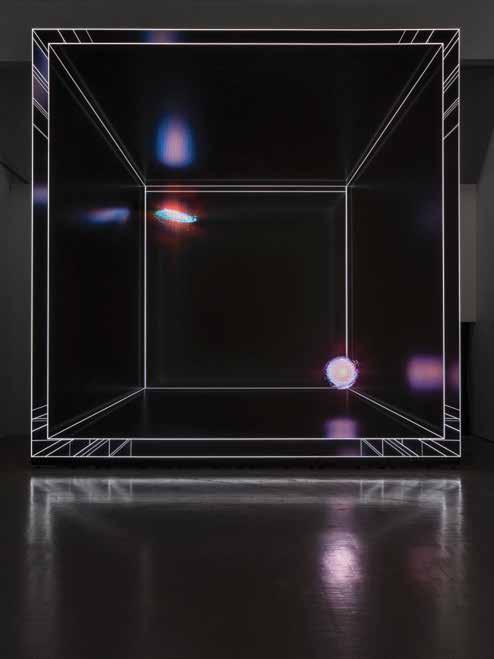
5 minute read
FEATURE Kris Polidano on a nostalgic Malta of the 1940s and 1960s
from Artpaper. #20
by Artpaper
. Feature /Malta / Magna Zmien
October - December 2022
Advertisement
MALTA
KRIS POLIDANO
RESTORING A YOUNGER MALTA
Extract from ‘Absent Presence’ by Mahmoud Darwish
. Still image from a Super 8 Film from the Jane Agius Collection, courtesy of The Magna Zmien Foundation I often get into a conversation where I’m told that the Maltese are a nostalgic people. I switch off after this statement is made. The answers always differ, but the cadences of their voices automatically slip into this minor-keyed sing-songy melancholy that anyone with even a faint presence of a Maltese accent slips into when they’re mourning. I have these conversations with people in the range of 23-25, mostly–– people my age — although I’ve met many exceptions. At some point I’m asked about what I do, and start out . with Magna Zmien. They tell me what a wonderful thing it is. I nod. Say, “I know”. And go on to babble about the miscellanies of the archive and the usual “support us” speech that I’ve mastered with passion. Then, sometimes, we get into discussions about who we are as young Maltese people, usually after spurting out something . we found out through the material at Magna Zmien. Recently, I’ve been choosing the example of the work I’ve been doing on a collection of photos belonging to Joseph “Il-Gululu” Darmanin with Magna Zmien’s team members. This set of around, 1,716 photographs, 3 8mm films, and 3 open reel tapes, is a snapshot of a young middle class Malta in the 1940s to 1960s. In total, there are around 10 photo albums in this collection, with images mostly containing photos of posed young women and holidays on motorcycle trips from Italy to Switzerland; Dino Rissi’s Il Sorpasso with young overdressed Maltese men. I feel the nostalgia and the romanticism oozing out of me even as I write this. That last line shows it, I don’t even really need to mention it, it’s evident; but the effect that this archive has on the people that experience it is truly surreal. Unlike with other things, I feel comfortable speaking in absolutes when I say that the work that every person has put into this project – donors, digitisation engineers, artists, the original person who recorded the moment, Maltese people, foreigners – is not lost on anyone. The connective potential that
KRIS POLIDANO (b.1999) is enamoured by culture in all its forms. Coming from a background in English and Maltese, her primary interest is narrative unfolds and unfurls in everyday life. Kris considers herself as a person who tries to join research with passionate artistic practice at every level; her work in promoting the arts, her writing and archival research.

. Prints from the set of images belonging to Joseph “Il-Gululu” Darmanin, courtesy of The Magna Zmien Foundation

. Magna Zmien can create throughout Malta’s communities and its diaspora is great. Even with a small team of around 3 part-time digitisation engineers and 4 core team members who work on a semi-voluntary basis, this year, Magna finally reached an incredible milestone. 100 donors’ collections have now been digitised by this small archival team, preserving thousands of memories.
Somewhat differently to entities like the National Archives, we are from being keepers of these memories. Donors lend . their cassette tapes, Super 8 film and so on to Magna Zmien for a short period of time during which their archival content is digitised and returned, allowing for films and voices that haven’t been heard in decades to be heard again without the physical connection between donors and their content being broken. Even though there are many sceptics of the . shift towards community archive digitisation that an archive like Magna Zmien represents, it’s important to note that whilst physical archives intend to preserve and restore the physical material, the act of digitisation preserves and particularly is restorative in many ways.
For the families who pay to digitise with the archive privately and support its finances, memories that sat in one family member’s cupboard are often shared around with extended family, with connections once dulled by time being sparked again and stories being . rediscovered. In the case of the people who licence Magna Zmien to keep and use their material, the restorative result to the memories it passes on to the public increases through the research, outreach and artistic collaborations that the archive has done over the years.
The digitisation process is the first phase of an intimate reconnection with the past, its memories and the people contained within it. As a young Maltese person who has the archive at my fingertips, gathering the stories (both pleasant and formally infamous, but forgotten) has been an experience of healing. Sharing it with other people, bringing different generations within the same space and discussing the past and its place in the present through Magna’s work is a necessity of a nation like our little island. Malta is young, it is confused. Its stories have been pushed back into whatever probably humid annals the people who once ruled us put them in or never even bothered to record.
The exercise that Magna Zmien is allowing artists and researchers do with its content will continue to help in this effort for Maltese people to heal, discover their identities and appreciate how the past has formed our present. As a young Maltese person spending my weekends with my back hunched over listening and watching the intimate memories of others; seeing how our landscape has . changed and community has dwindled, a movement like Magna Zmien is an act brought about by necessity.

SALADS BY DAY DRINKS BY NIGHT @ NO.43
43, MERCHANT STREET, VALLETTA











